December 21, 2024 | 18:34 GMT +7
December 21, 2024 | 18:34 GMT +7
Hotline: 0913.378.918
December 21, 2024 | 18:34 GMT +7
Hotline: 0913.378.918
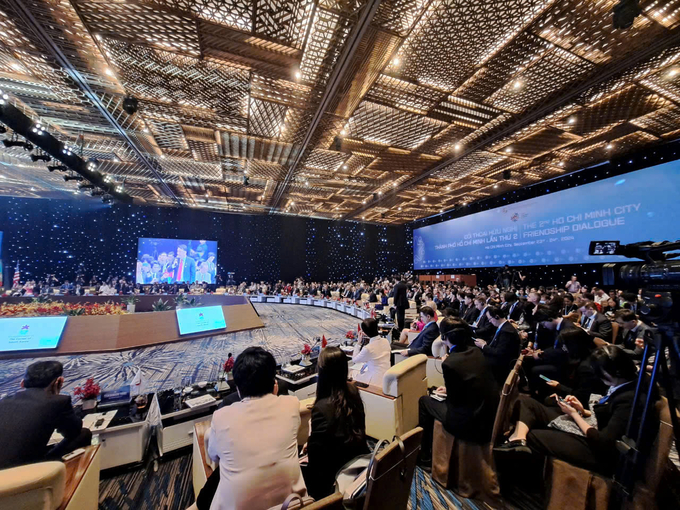
The entire Ho Chi Minh City Friendship Dialogue 2024 with representatives of 35 participating countries. Photo: HT.
Therefore, the city has established climate change cooperation programs with partners including the Asian Development Bank, Osaka City (Japan), and the C40 organization. It is also fostering investment cooperation and expanding collaboration with new partners to implement activities that address climate change and exchange experiences. Ho Chi Minh City and Osaka executed the "Low-Carbon City Development Program" for the 2021-2025 period in 2021.
35 cities from various countries, including the United States, Russia, Japan, Belarus, China, South Korea, Cuba, Germany, Hungary, Portugal, Uruguay, Australia, Laos, Cambodia, and others, participated in the Ho Chi Minh City Friendship Dialogue 2024. Additionally, international organizations and business associations from both domestic and international regions were in attendance.
At the dialogue, Osaka City, Japan, provided valuable insights regarding its effort to become a habitable city. In addition, Osaka City affirmed its ongoing backing of Ho Chi Minh City's transition to a "green city," as stipulated in the 2021 agreement.
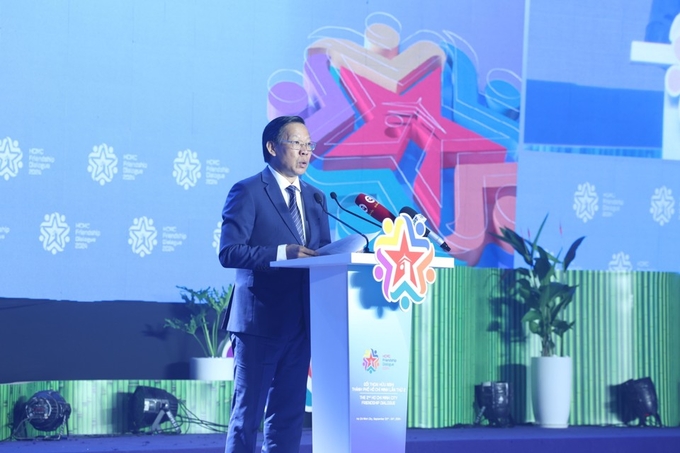
Chairman of Ho Chi Minh City People's Committee Phan Van Mai speaks at the 2024 friendship dialogue. Photo: HT.
Mr. Takahashi Toru, the Deputy Mayor of Osaka City, described his experiences in the process of transforming Osaka into a tourism, cultural, and economic hub of Japan during the dialogue. Mr. Takahashi Toru observed that Osaka City, situated in Osaka Prefecture, occupies nearly 7.2% of Japan's landmass and has a population around 20 million. It contributes 15.3% of the nation's Gross Regional Product (GRP), which places its economic magnitude on par with that of the Netherlands. Osaka has been a commercial and industrial hub for a long time, earning the nickname "heart" of the Kansai region.
It is the goal of Osaka City to attain carbon neutrality by 2050 through the "Zero Carbon Osaka" initiative. Furthermore, the city has implemented a "Digital Transformation" (DX) strategy to restructure the urban environment and public services.
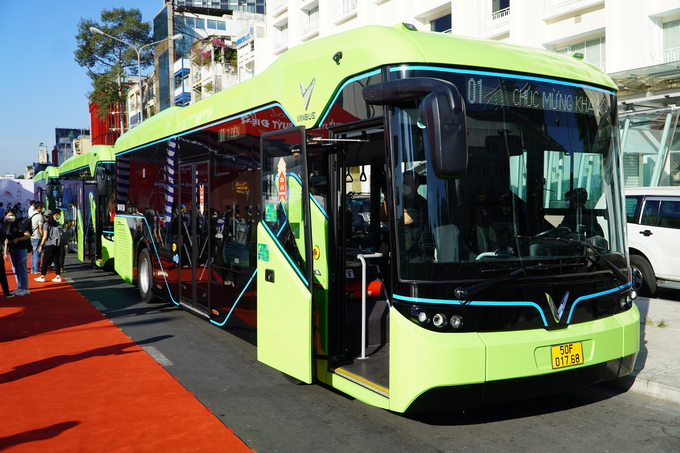
Green buses, one of Ho Chi Minh City's solutions to reduce greenhouse gas emissions. Photo: HT.
By promoting the establishment of carbon-free cities in Asia and other regions, Osaka remains committed to addressing the global issue of climate change in the environmental sector. Osaka has collaborated with Ho Chi Minh City to promote the "Ho Chi Minh City Climate Change Action Plan (CCAP)" in addition to business partnerships, as outlined in the "Memorandum of Understanding on Developing Low-Carbon Areas - Carbon City Cooperation between the Two Cities."
13 Joint Crediting Mechanism (JCM) projects, which are a carbon emission reduction mechanism proposed by Japan, have been implemented through policy dialogues based on a memorandum of understanding, according to Mr. Takahashi Toru. These projects are designed to implement low-carbon city development programs through advanced technology.
In the "Leading Area of Decarbonization," Osaka City encourages the use of renewable energy and energy conservation through incorporating solar power systems with window glass and high-efficiency air conditioning systems, as Mr. Takahashi Toru further explained. This could result in the creation of Zero Energy Buildings (ZEB), which assist in the distribution of energy to neighboring buildings and the acquisition of renewable energy to facilitate recuperation in regions that are suitable for renewable energy.
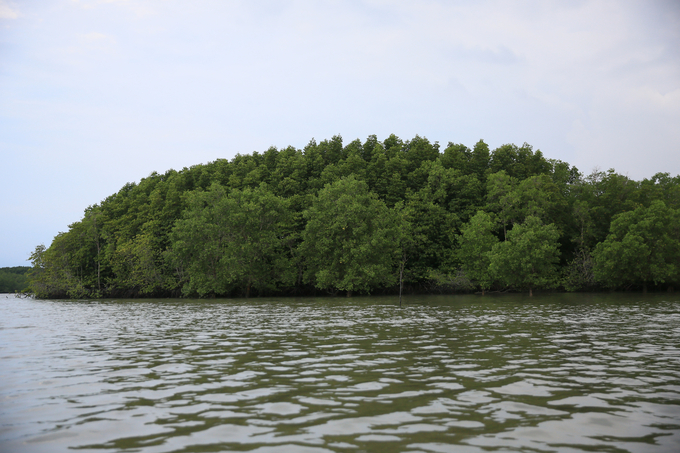
Protecting and developing the forest ecosystem of the Can Gio mangrove biosphere reserve is one of the important solutions to reduce greenhouse gas emissions. Photo: HT.
The Osaka Research Institute of Industrial Science and Technology in Osaka offers technical assistance to private enterprises. The "Osaka Green Technology Association," which is under the control of this institute, is responsible for the distribution of information at a variety of forums and exhibitions. It also functions as a central location for the exchange of information among companies, researchers, and other relevant organizations. Working group activities emphasize high-speed communication and next-generation battery technology.
Furthermore, the Osaka Innovation Center is a specialized organization that focuses on developing new innovations and providing assistance in the commercialization of projects and the establishment of business communities.
Mr. Takahashi Toru also introduced several companies that are engaged in decarbonization efforts, including Jikantechno, which manages agricultural waste such as rice husks, which is a source of methane and carbon dioxide emissions. The company uses a unique process to transform refuse into high-purity carbon and silicon materials. Revo Energy, an additional organization, concentrates on the cultivation of hydroponic rice and the investigation of the production of biodiesel from cultivated green microorganisms termed "Midorimushi."
Ho Chi Minh City has inked a cooperation agreement with the National Park, a state management committee for green parks in Singapore, to provide legal documents, technical materials, regulations, and standards for application, as well as to train staff and experts in green park planning, management, and care.
The United States Agency for International Development (USAID) and the Department of Natural Resources and Environment (DoNRE) of Ho Chi Minh City (DoNRE) recently collaborated to plan a workshop to devise an action plan for the city to achieve net-zero emissions. During the workshop, managers and experts exchanged information regarding the urban energy emission initiative in Ho Chi Minh City.
In an effort to mitigate greenhouse gas emissions, the city is advancing the development of its extant forest ecosystems, particularly the Can Gio Mangrove Biosphere Reserve, in the districts of Can Gio, Binh Chanh, and Cu Chi, as per DoNRE.
According to the approved plan, the objectives for forest development are as follows: the establishment of forests, the maintenance of forests, the encouragement of natural regeneration, and the enhancement of protected forests. The preparation of procedures to execute these activities is currently underway. Moreover, Ho Chi Minh City is proactively conducting fire prevention work in forests during the drought season to prevent the occurrence of forest fires or dispersed crop fires in 2023.
Translated by Linh Linh
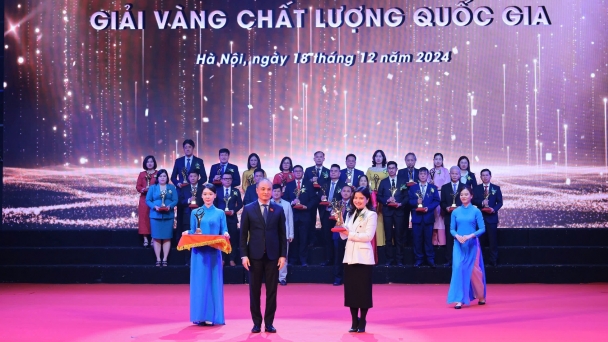
(VAN) On the evening of December 18th in Hanoi, the Ministry of Science and Technology held a ceremony to present the National Quality Awards for the years 2021, 2022 and 2023 to 133 businesses.
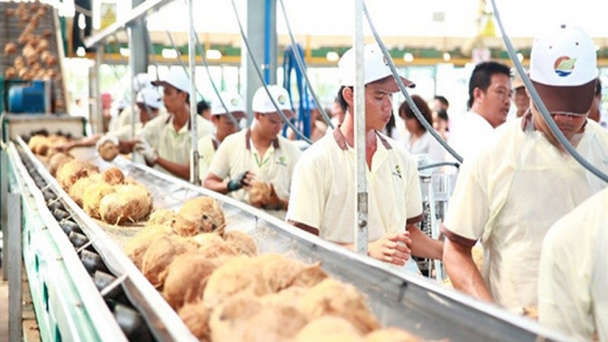
(VAN) On December 18, MARD and the People's Committee of Tien Giang Province hosted a forum in My Tho City to discuss the promotion of FDI and the increase in the export of coconut products.
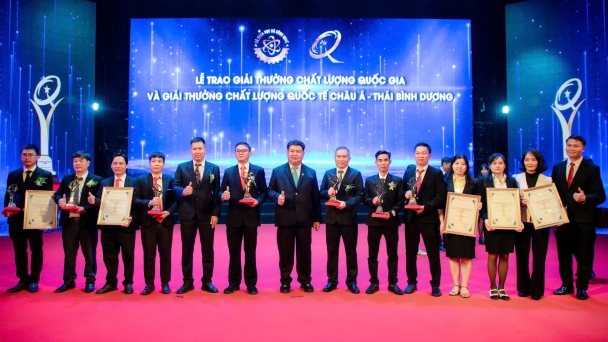
(VAN) The C.P. Vietnam Animal Feed Industry won multiple awards at the 'National Quality Awards Ceremony, Asia-Pacific Quality Awards 2021-2023'.
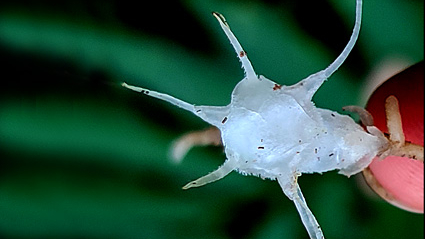
(VAN) A new non-photosynthetic plant founded in Xuan Lien Nature Reserve, adding further evidence that it is one of the most biologically diverse and ecologically significant protected areas in Vietnam.
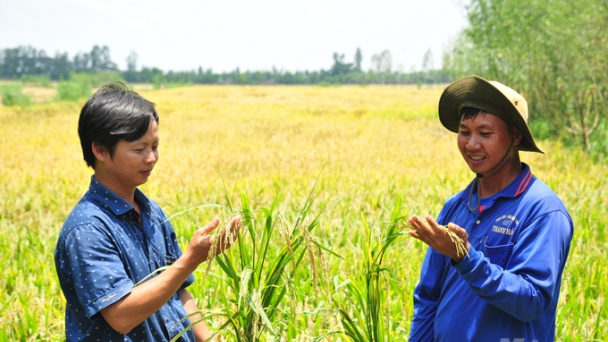
(VAN) Ecological rice farming not only reduces the impact of agricultural chemicals but also leverages the benefits of the flood season to restore the field ecosystem.
/2024/12/19/0314-0-nongnghiep-180309.jpg)
(VAN) With the motto of bringing vegetarian food to the world, Vuong Ngoc Vegan Company has turned cashew fruits, considered a waste product in agriculture, into premium vegetarian fish sauce.
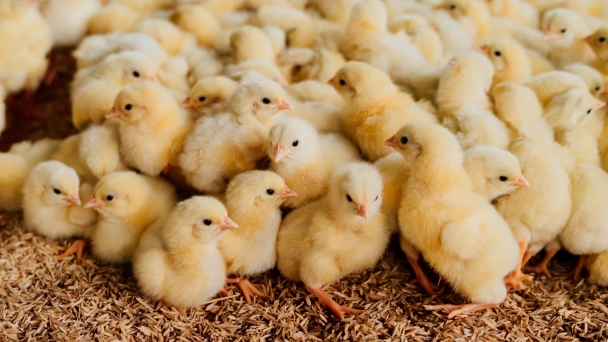
(VAN) New technology enables hatcheries to quickly peer into millions of fertilized eggs and spot male embryos, then grind them up before they mature into chicks.